|
|
|
Sort Order |
|
|
|
Items / Page
|
|
|
|
|
|
|
| Srl | Item |
| 1 |
ID:
189408
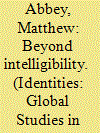

|
|
|
|
|
| Summary/Abstract |
This article explores the haunting aspects of queer migration within two documentary films: Season of Migration to the North (Laumann 2015), a film about a queer Sudanese migrant who fled to Norway after hosting a fashion show, and Shelter: Farewell to Eden (Masi 2019), a film about a Filipino transgender migrant navigating European borders. Instead of focusing on how the films make the protagonists intelligible, I focus on how absences are conjured to question the necessity of making the subject intelligible. This is important because queer migrants are often framed as only victims of persecution who must become intelligible to the demands of sexual humanitarianism. Disrupting the way visibility is heralded as an achievement for queer migrants, I explore the importance of unintelligibility in migration, especially when the terms of appearance are controlled by not only norms surrounding sexuality, gender, race, and class but also the violence of European borders.
|
|
|
|
|
|
|
|
|
|
|
|
|
|
|
|
| 2 |
ID:
189407


|
|
|
|
|
| Summary/Abstract |
This paper argues that ‘doing’ football – as in playing, watching, talking about – constitutes a social field that cuts across otherwise racially coded urban landscapes. Where most work on fan cultures explore social practices and rituals inside that sacred space, the stadium, the focus here is on the interweaving of ‘doing football’ with the wider socio-cultural fabric incorporating neighbourhood spaces and stadiums. Expanding on Les Back’s notion of localised cultural spaces, oral histories of black Millwall fans will be used to critically engage with the popular perception of Millwall as a ‘racist club’. It is argued that the use of racial markers at The Den is used to target the opposition, whereas black Millwall supporters are accepted as contingent insiders.
|
|
|
|
|
|
|
|
|
|
|
|
|
|
|
|
| 3 |
ID:
189413
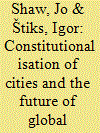

|
|
|
|
|
| Summary/Abstract |
The constitutionalisation of cities is analysed as a process through which urban residents operate as constitutionalising forces within their cities through lived experiences, practices and engagement, and cities try to impose themselves as constitutionalising forces within a rapidly transforming global society. This article explores the tensions generated by the constitutionalisation of cities. It focuses on identifying their character, assessing current economic and socio-cultural processes within cities and articulating a vision of the cityscape. Finally, it applies the idea of chronotopes, as developed in literary studies, to the study of cities. This multidisciplinary approach allows us to understand the constitutionalisation of cities, so far as they seek to break into a global society dominated by states and financial capital. It suggests a vision in which acts of urban citizenship may become emancipatory.
|
|
|
|
|
|
|
|
|
|
|
|
|
|
|
|
| 4 |
ID:
189409
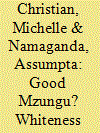

|
|
|
|
|
| Summary/Abstract |
Scholars looking at whiteness through a postcolonial lens have notably explored the lingering and multi-faceted nature of whiteness in the wake of empire. We apply Shome’s argument that whiteness is rendered visible through how it is ‘disembodied’ to explore how whiteness is signified and interpreted in a postcolonial Ugandan context and with the term Mzungu. Disembodied whiteness centres the discursive and material forms of whiteness. Interview and focus group data from domestic workers who work for foreigners in Uganda are analysed. We argue in Uganda whiteness is structurally present in the growth of the development aid state and discursively understood in contrast and relation to Africanness and Blackness. Whiteness, Mzungu, African, Black represents multiple understandings and a duality for the Ugandan domestic workers who work in the foreign households of the aid state. Ultimately, postcolonial whiteness in Uganda sustains white supremacy, but fissures, contestation, and disruption also follow its production.
|
|
|
|
|
|
|
|
|
|
|
|
|
|
|
|
| 5 |
ID:
189412


|
|
|
|
|
| Summary/Abstract |
Using open-ended, semi-structured interviews, this essay analyzes the various ways second-generation Haitians negotiate their ethnic identity in the Bahamas. Second-generation Haitians are exposed to and sometimes forced to choose between two cultures because they have been told they cannot be both Haitian and Bahamian. Based on participant’s responses, six categories emerged: individual, African/Black, Bahamian, Bahamian of Haitian descent, Haitian, and Haitian-Bahamian. This essay argues that second-generation Haitians negotiate similar sociocultural factors in the construction of their identity. Growing up in a country where there is a stigma of being Haitian, participants negotiated connection to culture, citizenship, stigma, belonging, and self-ascription/ascription by others. Further, I argue that identities such as Bahamian, Bahamian of Haitian descent, and Haitian-Bahamian are challenging ideas of what it means to be Bahamian. Last, I argue that the Haitian identity is formed primarily in resistance to and protection from the hostility experienced in the Bahamas.
|
|
|
|
|
|
|
|
|
|
|
|
|
|
|
|
| 6 |
ID:
189410
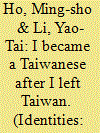

|
|
|
|
|
| Summary/Abstract |
Migration and transnationalism studies use variables such as migration trajectory, length of stay, and ties with origin country to examine migrant identities. Research has also found that contrary to the prediction of assimilation theory, some well-adapted migrants activate their origin country identities. Using young Taiwanese immigrants who stayed in Taiwan for most of their lives and went to the United States as a case, this article examines the mechanisms of context- and event-driven identity shift. We argue that these young adult Taiwanese immigrants – most of whom are first-generation – find that they are situated in a context where they have to ‘choose’ and ‘perform’ an identity for everyday interaction. Negative experiences with Chinese immigrants and the realization of Taiwan’s marginality encouraged them to activate their homeland (Taiwan) identity. This article contributes to migration and identity literature by analysing the consequences (identity triggers and shifts) of everyday encounters and events in an immigration setting.
|
|
|
|
|
|
|
|
|
|
|
|
|
|
|
|
| 7 |
ID:
189406
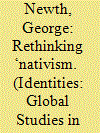

|
|
|
|
|
| Summary/Abstract |
Existing ideational approaches to nativism tend to conflate the concept with nationalism, xenophobia and populism, as well as overlooking the role of racism and racialisation in the process of constructing the non-native ‘out-group’, against the native ‘in-group’. Inspired by the Discourse Theoretical approach to populism, this article offers a significant conceptual contribution to studies on the far right by interpreting nativism as a racist and xenophobic discourse structured around an exclusionary vision of the nation. This conceptualisation helps identify how xenophobia, nationalism, racism and racialisation all contribute to nativist discourse, how nativism can be clearly demarcated from populism, and how nativist arguments can be articulated by parties beyond the far right.
|
|
|
|
|
|
|
|
|
|
|
|
|
|
|
|
| 8 |
ID:
189411


|
|
|
|
|
| Summary/Abstract |
This article explores how marriage animates the racial logic of the security state. While the pursuit of romantic love culminating in a wedding is considered to be a universal good, arranged marriages are viewed as a dangerous anachronism which threaten the state’s authority. By revealing the animating force of arranged marriage in the UK immigration regime and the War on Terror, we can see the central role of love marriage within the principles of choice, autonomy and individuality around which the liberal subject organises their moral economy. The legalisation of gay marriage – constructed as a kind of love marriagepar excellence – becomes the means through which the nation state can uphold this moral economy and be renewed and reinvigorated in the process. By putting gay marriage in dialogue with arranged marriage, the gendered and racial configuration of the UK as a security state becomes visible.
|
|
|
|
|
|
|
|
|
|
|
|
|
|
|
|
|
|
|
|
|